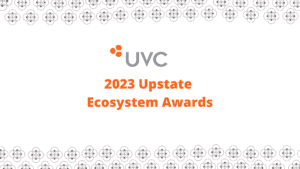Robert Manasier knew at a very young age that he never wanted to work for anyone, so he created a landscaping company with friends from football and baseball teams with whom he played growing up in both Rockland County and Montvale, New Jersey. It got them through college.
“It took me about 20 hours to figure that when you’re the leader, you actually work for everybody—your employees, your employees’ families, and your clients,” he says.
He also quickly discovered that he relished what he calls the “servant/leader” role.
“It was very important to me to keep people together, build a culture, empower people, and educate people. Finding the right people to fill in all my weaknesses became my constant goal.”
As a serial entrepreneur and investor, Manasier does much the same thing today.
“We figure out how to make businesses stronger by filling in the elements they’re missing,” he says.
Manasier is CEO of Saratoga Springs-based In Focus Brands, a branded go-to-market acceleration firm; COO of Autonomy Distributors, a US products export partner, and president of IFP Films, an award-winning multimedia content-creation studio. A Saratoga Springs Recreation Commissioner, he has coached many community baseball, football, softball, soccer, and basketball teams – an experience from which he has drawn multiple lessons as an entrepreneur.
Interviewed by E. Patrice Perkins at the September edition of Startup Grind Albany, Manasier spoke candidly about the challenges and satisfactions of being an entrepreneur, with a particular focus on building relationships and culture. Following are a few choice excerpts on a wide range of topics covered in an hour-long discussion.
Being an entrepreneur. “I love doing something different every day. I love the relationships I develop. For me, it’s always the relationships. It’s meeting new people, learning about new ideas, putting new teams together. That’s what keeps me going every day. There’s something better, and I can build something bigger.”
Self-understanding. “When you’re an entrepreneur just starting out, the first thing you have to do is look inward. You really need to understand what you’re good at, what you’re bad at, how you work, what you need around you to make you more efficient. Our failures often are due to the fact that we think we’re someone that we’re not. You have to look in yourself to build a company that’s going to match who you are and how you work.”
Building relationships and culture. “If you’re running a company, you’re coaching your people to be better than you are. Don’t try to put structure on them if they don’t need it. In our organization, if you need to be micromanaged, you won’t last 24 hours because you’re held to high expectations and given responsibilities, deadlines and the freedom to get your work done however and wherever you want/need to do it.”
Team-building. “We look at the dynamics of the team that we’re helping. If it’s just one person, we ask: Who do they need around them to form the team? If the team has a lot of members, you typically have redundancy. That means you have to set expectations and responsibilities so people aren’t falling over each other.”
Coaching. “If you can set expectations, and you hire the right people who embrace those expectations, you don’t have a lot of work to do. You just have to be sure they have the resources that make it likelier for them to succeed than fail. When you coach a team, you don’t put players in positions where they’re bound to fail. You put them in positions where they can get some confidence and they have a higher probability of success.”
Sustaining entrepreneurial energy. “People say they have a work life and a play life. For us, they’re the same. When you think of your enterprise as a mosaic or puzzle, it just works better. You don’t feel that you’re working, but you’re working all the time. As technology makes life easier for people to stay in touch, you’re going to see more and more flex time and options where you don’t have to be in an office 9 to 5.”
Failure. “Sometimes you just fall flat on your face. That’s OK. The question is: Do you learn something from it? Hopefully you do. If you’re an athlete, you understand that you’re going to fail more than you succeed. A .300 batter in baseball fails seven out of ten times. You just have to learn from it and go at it again.”
Staying grounded. “A lot of ego-driven companies are very successful. I won’t talk badly about them because they’ve built a culture that works for them. For me, it’s more important that everyone associated with the business is enjoying a great life. I need a roundtable because it keeps me grounded.”
Launching businesses with friends. “Don’t start a business with a friend unless there’s a perfect fit. When you’re just starting out, those deep layers of relationships can get in the way of good business decisions. They also can mask weaknesses, because you’ll put up with more garbage from people who are close to you. Bring in friends and family members when there’s more structure.”
Advice for students. “We can’t teach students the entrepreneurial spirit, but we can teach them the entrepreneurial process. One reason we run Startup Weekends is to give people in three days a sense of what it means to be an entrepreneur. Some will say, “I’ll never do this again,” and that’s fine. They’ve found a safe place to fail and learn something about what they like and don’t like. This is the true beauty and function of academic entrepreneurship − a safe place to fail.”
Next Up -> Driving the BrainWay: New Service to Help Incubators Develop Markets Overseas


